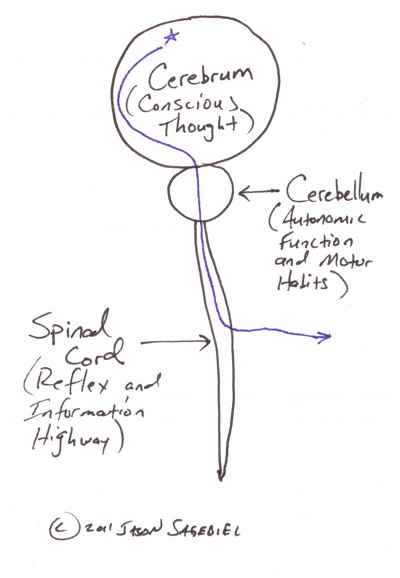How are motor habits formed, and why should I care?
Many musicians, especially young ones, just sit down to play music. It’s hard to sit down and do work when we just want to play. However, a little bit of smart work will make a big difference in how well we can play, how accurately we play, and how easily we play. If you can understand how your brain actually learns to play music, and you can practice in a way that supports that, you are going to make great progress!
In short, when you practice consciously and make accurate, conscious movements many times, another part of your brain remembers how to do those movements. That other part of your brain stores that information as a habit and when you play it again after the habit has been formed, you don’t need to think about it and it happens automatically. The possibilities for your playing are endless.
The formation of motor habits
You central nervous system has 3 main parts: The cerebrum, which controls conscious movement, thoughts, and voluntary action; the cerebellum, which controls lower autonomic function like breathing and digestion, and conditioned reflex; and the spinal cord, which controls reflex and acts as an information highway.
When accurate movements are made consciously and repetitively by the cerebrum, that signal travels through the cerebellum which picks up that movement and remembers it as a habit (a conditioned reflex). This purple line on this diagram, while not anatomically correct, shows the general signal path:
Signal Path: Formation of Motor Habits
Here is why understanding this process is so important. Every action in your practice must be done accurately and correctly. If not, there is a danger that the poor movement might be picked up by the cerebellum and become a bad habit. The cerebellum is not so smart – it can’t distinguish between good movements and bad movements, and it remembers them all!

Also, if the movement is not clear in the mind and is not done consciously the cerebellum can become random and confused, leading to performance errors and frustration.
It should also be noted that any tension you have when you practice can also be stored as a motor habit. So, if you are practicing with tension, then it becomes very difficult to rid yourself of that habit. Tension is a particularly dangerous habit. I’ll discuss that in the next post.
So, if you practice often, consciously, accurately, repetitively and without tension, you will form great habits. So, as always, waste no time and get to practice!
Related

